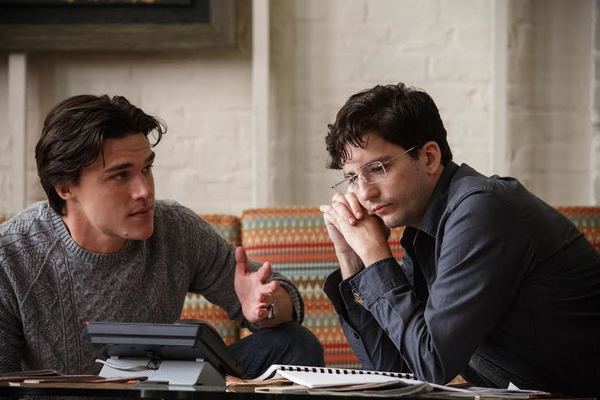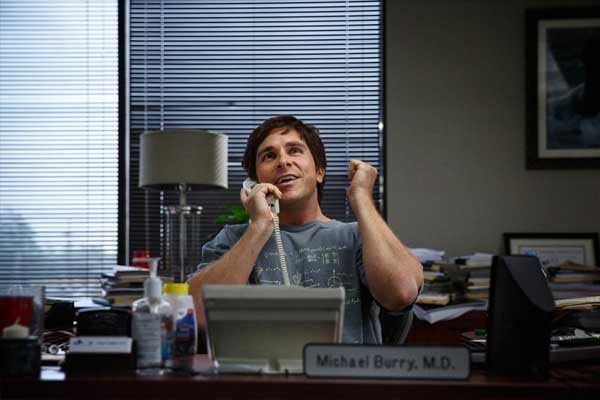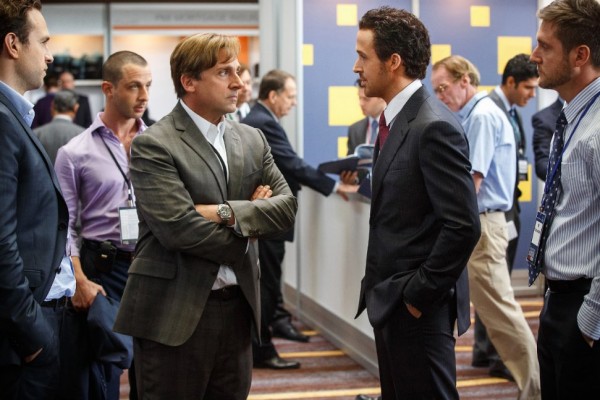The Big Short Review
The man behind “Anchorman” and “Step Brothers” brings you … one of the best films of the year …? Seems ridiculous, but you could make a case for it to be true. Adam McKay’s “The Big Short,” based on the book by Michael Lewis (also of “The Blinds Side” and “Moneyball”), is a comical tragedy about the men who saw our economy propped up on bad mortgage loans and bet against the banks, thereby cashing in on the economic crisis of 2008.
It’s easy enough to make a slick business film full of powerhouse performances from great actors playing charismatic slime ball characters — take “The Wolf of Wall Street,” for example — and in many ways McKay tries to make that flashy sort of drama, but on the other hand, “The Big Short” isn’t about crime and corruption (of the main characters, at least), it’s about discovering just how deep a bad system goes and what’s at stake for not just the characters, but the country.
“The Big Short” follows three different story lines of individuals who discovered the truth and bought credit default swaps from the banks, giving them millions, knowing that if the loans defaulted, they’d make a killing: Dr. Michael Burry (Christian Bale), the oddball hedge fund manager who wears shorts and no shoes to work that made the discovery; Jared Vennett (Ryan Gosling), a trader who learns what Burry’s doing and engages hedge fund manager Mark Baum (Steve Carell) and his team, who are known for their distrust of the system; and Charlie Geller (John Magaro) and Jamie Shipley (Finn Witrock), two young and inexperienced investors who discover what Vennett is doing and enlist the help of retired banker Ben Rickert (Brad Pitt) so they can trade at such a high level.

The characters aren’t anywhere near as complicated as the financial concepts driving the plot. What McKay and co-writer Charles Randolph do best with this script is make it user-friendly. There’s no possible way for someone not in this business to understand every financial concept at work, but McKay and Randolph utilize various methods to help communicate that information, including celebrity cameos explaining the most difficult concepts and a character-narrator in Gosling’s Jared Vennett who breaks the fourth wall to help clue the audience in at different points throughout the film.
“The Big Short” plays out like a procedural or a mystery, particularly when Baum’s team goes out looking for proof to back up the numbers and theories. They dig deeper and we discover alongside them just what lengths the banks have gone to to sweep this problem under the rug and just how hard the economy could fall. This journey is full of humor, especially generated by the demeanors of Bale, Gosling and especially Carell’s characters.
McKay also supplements the story with all manner of techniques, from the more overt and flashy to the subtle and dramatic. Most of what he goes for sticks, but a lot of it falls flat, or feels forced or purposeless. There’s some unnecessary use of montage and forced B-roll to go with Gosling’s narration. “The Big Short” is really at its best when McKay steps back and lets the actors take over.

These are total characters — as in full of comical neuroses. What do you expect to happen when you give the likes of Christian Bale a character description that includes being anti-social, into heavy metal drumming and a glass eye? It’s like watching an eccentric artist given free reign to do anything he or she wants. Bale doesn’t go off the deep end — his character actually has some of the quieter and better dramatic moments of the film, but it’s hard to call what he or any of the actors do in this film inspired or surprising.
Carell is the true standout as Baum, a character whose natural inclinations are to speak out inappropriately and go against the grain, who is happiest when he’s miserable and yet whose moral convictions are sound and resolute. Quirky, loud characters are in Carell’s wheelhouse, yet he gives Baum a complexity and nuance that makes the role rather transformative. More importantly, Carell swings from comedy to drama effortlessly in this film with a truly committed performance.
The entire film swings from comedy to drama, which is really what makes “The Big Short” succeed. We spend so much time waiting for the payoff — literally in terms of when the characters’ investments pay off and figuratively in terms of the narrative — yet there really is none. We get so wound up in the story and McKay catches us; when the scope of the film widens again, reminding us that the success of the main characters equates to the biggest economic crisis since the Great Depression, the film becomes a meaningfully sobering experience. It’s anti-climactic, but in the right way. It would be wrong to give us the Hollywood ending to the glossy business comedy and McKay nails that reversal of tone.
“The Big Short” is bit of a messy collage of storytelling tactics and tones, but it is imminently watchable thanks to its sensitivity to the subject and the caliber of big- time performances that the movies are all about. It’s a film that will surely hold up well with repeated viewings and perhaps even get better.
4/5 Stars
The Big Short
Directed by Adam McKay
Written Charles Randolph and Adam McKay, Michael Lewis (book)
Starring: Steve Carell, Christian Bale, Ryan Gosling





0 Comments
You can be the first one to leave a comment.